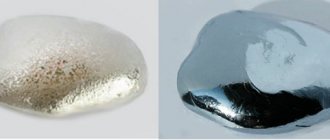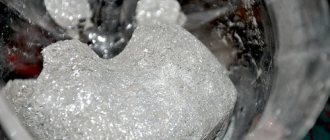Metal cleaning method: what is the essence
Refining requires special equipment. Typically, the processes are organized in a factory setting, and the cleaning is step-by-step. The material is processed chemically, then polished and cleaned with highly concentrated compounds. In Moscow, metal cleaning methods are relevant when working in factory conditions. Proper organization of the process guarantees the achievement of a given level of purity of the final product.
For refining, the starting material is mine concentrate and scrap of precious items. To prepare the metal, it is combined with zinc at high temperatures, then crushed and fired. Primary purification technology is implemented by dry, wet, and electrolysis methods. Electrolytic processes have narrowed the scope of application of other methods. Many factories with equipment for electrolytic methods of metal purification are located in Moscow.
You can use scrap jewelry, equipment, and returnable waste. They process solutions, radio components, powders, ash, wire, batteries, film and photographic film, catalysts, and slags. The raw materials used are sludge resulting from electrical cleaning, silver oxide compounds, cyanide, silver bromide, and silver sulphide.
Refining of precious metals
Services for refining raw materials containing precious metals are historically the first type of activity of the plant. Throughout its development and in the present period, EZ OCM JSC continues to pay attention to the development of refining services.
Bulk platinum, scrap gold, Doré alloy, concentrates of platinum group metals, technical and jewelry scrap, nitrogen industry sludge, spent catalysts from the petrochemical and automotive industries, lining masses for glass melting devices (fireclay chips) - this is not a complete list of refining objects.
Processing of such diverse raw materials is ensured by mastery of both classical hydrometallurgical refining methods (precipitation, sorption, electrochemical and distillation techniques) and the most modern technologies: electron beam remelting, vacuum distillation, high-temperature chlorination, plasma metal extraction system and molecular recognition technology (MRI) .
Processing products are powders and granules of refined metals, measured and standard (bank) bars, as well as chemical compounds of precious metals.
Currently, EZ OCM JSC processes the following types of raw materials:
Primary (mineral) raw materials:
- schlich platinum;
- spot gold;
- gold-silver alloy;
- PGM concentrates;
- zinc deposits.
Secondary (technogenic) raw materials:
- scrap catalytic systems (catalyst mesh and catch mesh);
- scrap of glass melting devices (glass melting apparatus and spinneret feeders);
- scrap of technical products from PGM;
- jewelry production scrap;
- technological waste from mirror production;
- electronic scrap;
- sludge from nitrogen industry enterprises;
- near-wall layers of lining of glass melting devices;
- spent catalysts from the nitrogen industry, petrochemical and automotive industries;
- other scrap containing DM.
Processing (refining) products:
- Measured and standard ingots;
- Powders and granules;
- Chemical compounds.

Depending on the characteristics of the processed raw materials, a combination of pyro- and hydrometallurgical methods can be effectively used in the production cycle, which allows one to obtain refined metal with a content of the main component of 99.93%-99.999% in accordance with the requirements of regulatory documentation.
Modern, reliable and high-performance technological equipment from the world's leading manufacturers and our own production, as well as unique technologies that have no analogues in world practice, allow us to solve all emerging problems when processing various types of raw materials containing DM, producing high-quality products from refined metals: ingots, granules, powders and chemical compounds of precious metals.
Contact Information:
Filippova Natalya Alexandrovna
tel. +7 (343) 311-47-53
Various technologies
The preferred methods when working with silver and gold are electrolytic. During the process, valuable rock is deposited and the sludge is separated. As a metal cleaning method, refining is valuable due to its good results. The output sample is 999.9. The method is beneficial because it requires minimal costs and the operating conditions are acceptable.
Wet refining is the optimal method for purifying metals when working with platinum, palladium, and iridium. A complex dissolution system is used for such raw materials. During processing, the rock is dissolved with aqua regia, which acts as a catalyst for the reaction. Using reagents, pure metal is isolated.
Sell gold
Dry refining is a metal purification method used when working with gold. The raw materials are pre-treated with chlorine, after which electrolytic purification begins. The product sample after preliminary evaporation is 996.5. When processed using the dry method, the final silver purity is 999.0.
Albums[edit]
Almost all albums (except for the early singles) are conceptual, connected by a common plot, and there is not much point in listening to individual songs outside the albums.
Mini-albums[edit]
- 2013 — Refining
- 2013 — Children
- 2014 — Flying/Growing
- 2017 — Mira
Number albums[edit]
- 2013 — Me and Mobius are going to Champagne
- 2015 — Russian songs. Part 1
- 2015 — Russian songs. Part 2
- 2016 — Russian songs. Afterword
- 2017 — Make the sea
- 2018 - Gold
(conceptual trilogy of three mini-albums):
You who found
(part 1) - Room with personal belongings
(part 2) - Miracle
(part 3)
Injured. Killed . Published with the subtitle “Criminal mystery in 10 acts.”
Working with silver
An effective dry method for cleaning metal is soda. Soda chloride is combined with sodium carbonate in equal proportions, heated in a half-empty crucible, waiting for the gas evolution process to complete. Then the temperature is raised so that the silver melts quietly, and the mixture is cooled. Having taken out the metal, it is melted and cast again. The process is relatively fast. The only drawback is the destruction of the crucible due to prolonged exposure to soda.
Sell gold
Cupping is a wet cleaning method recommended if the purity of the original silver material is low.
Technologically, this is an oxidative reaction of lead and waste containing precious metals. Lead molten with silver is oxidized and separated from the processed mass, simultaneously removing impurities. The raw materials of the platinum family are preserved in the alloy. ◄ Back to news
In cinema
Alexey Rybin used the songs “Affinage” (“Like”, “Sodom and Gomorrah” and “Sasha”) as the soundtrack for his debut full-length feature film “Soon Everything Will End” (2017), which was included in the main competition of the Kinotavr film festival[72 ][73], and was also awarded the prize of the “Rossiyskaya Gazeta” and its online festival “Double dv@”[74]. Rybin himself says that the songs used in the film are not random and were selected for almost a year. They carry a semantic load, “are perceived as the internal monologues of the heroes”
[75]. The compositions “Affinage” attracted attention, according to Rybin, also because they did not use a rhythm section at all[76]. Film critic Elena Stishova about
[75].
Perception
Reviewing the group’s album “Russian Songs,” Colta.ru columnist Sergei Mezenov summarizes that “the St. Petersburg group “Affinage” clearly wants to start a serious conversation about what will happen to the Motherland and to us.”
and is able
to “live up to his self-confident bid to become the new DDT”
[70].
According to the Afisha-Daily reviewer, the band members “sound very decent - thanks to the non-obvious instrumental composition, and because of good melodic hooks, and because of the sense of style (the musicians perform in suits)”
[69].
Evgeny Khaknazarov from Fontanka.ru described “Affinage” as “a wandering orchestra performing “black” chanson. Nostalgia, inner restlessness, longing for a distant childhood - these are their themes.”
[77].
According to Anton Lin, editor of Rubel magazine, “Affinage” is “new Russian music for which there is no shame”
, however, such a product
is “not really for the mass consumer”
[78].
Music columnist for Rossiyskaya Gazeta Alexander Alekseev about
[68].
Observer Ilya Zinin attributed “Affinage” to the new guitar scene and called it a “near-folk group”
, which
“went completely under the radar of the music press
,” but at the same time is very popular among listeners[79].
“Affinage” - about the St. Petersburg flair, the magic of acoustics and the most unusual performances
The Affinage group today is one of the most famous and sought-after groups. They are guaranteed a warm welcome both in clubs and at festival venues. They manage to do everything: write and record new songs, travel all over the country with concerts. On July 26, the group will take the stage at the Muzeon Arts Park and play old and new songs with live percussion. The musicians guarantee that the audience will remember this concert for a long time.
On the eve of the concert, the founders and ideologists of Affinage Em Kalinin (vocalist, guitarist, lyricist) and bassist Sergei Shilyaev talked with Moscow 24 portal columnist Alexey Pevchev.

Photo courtesy of the press service
– You are one of the most popular groups in the capital’s clubs and festivals, but you started in Vologda. Why did you decide to move to St. Petersburg? Was this due to the fact that it is one of the rock capitals with a rich history?
Em: Oh, the first question, and there are already so many “buts” in my head! Let me start by saying that I don’t consider our team to be incredibly in demand or super popular. Maybe these are some overly inflated ambitions, maybe self-criticism and dull realism, but I personally don’t have such a feeling. Secondly, the Affinage group was born in St. Petersburg in 2012. We all lived in Vologda for some time (some were born, some came to study), and then we moved, also at different times. Circumstances just happened in such a happy way that we found each other and created a team. And we moved simply to live - to work, to study.
Sergey: St. Petersburg was the rock capital in the 1980s and 90s, that is, at the time when we were children. And, of course, in our province, stories about the Leningrad rock club, about the life of musical bohemia, were perceived as myths and legends of Ancient Greece. But each of us moved to St. Petersburg as a fully grown adult, so it can hardly be said that the rock mythology of the city and the desire to integrate into it played a decisive role here. In my impression, since the 2000s, the main musical trends, fashion trends and current artists come mainly from Moscow, and it is more logical to go to the capital for success in show business.
Video: YouTube/Lena Strygina
– Is this due to the fact that your style (which you denote by the conventional term “noir-chanson”) fits most harmoniously into St. Petersburg, and not into Moscow, where there are more opportunities to break through, but there is nothing you need?
Em: No, I don't think so. Let's say, for me it was a choice that was not associated with any consideration for a career and especially for the “atmosphere of the music that we will play.” If only because I had no idea that Affinage would appear.
Sergey: The legendary flair of St. Petersburg - it, of course, transforms in the eyes of the beholder much that comes from the city, including music. But in general, the question of our belonging to the “St. Petersburg school” is one of the most controversial. We encounter this kind of perception all the time. I think the point here is that Leningrad and later St. Petersburg rock is, as is commonly believed, primarily heroic rock, which is trying to broadcast something so important to the world. Not only to convey personal experiences or entertain the listener, but to somehow change him internally. In this sense, yes, this is about “Affinage”.
And, of course, the fact that we are simple guys with instruments who overcome our entire journey on our own, without being a producer’s project, without receiving influential support from the outside - this is not a Moscow story, but rather a romantic St. Petersburg one. About friends with hungry eyes and their belief in success. And the term “noir chanson” was an attempt to isolate itself from already existing tags, to find its own face not only musically, but also formally, denoting itself with a new definition.
In general, the question of our belonging to the “St. Petersburg school” is one of the most controversial.
– There are cases when groups specifically tried to write a “format” song in order to get on the radio. It seems that at Affinage everything went much more smoothly. At what point did you feel like a truly in-demand band?
Em: This is just an impression from the outside - everything is different from the inside. The path to both radio stations and TV programs was difficult and thorny for us. From the very beginning to this day, we are an independent group. We are not patronized by influential people, we are not moved forward by large material injections, so everything we achieve is the result of personal hard work. Let's say, in my opinion, half of our material is absolutely formatted. And in terms of arrangements, and in content, and even in timing. However, it took a very long time for radio station program directors to understand this. The same song “Hero of My Childhood Dreams”, which is now heard on the radio, appeared in a recording back in 2013. And three years later she appeared on the radio waves. If everything was so easy, you must admit, she would have appeared there right away, because this track was a hit from the very beginning. But then we were unknown to anyone and not noticed by anyone.

Photo courtesy of the press service
– Almost from the very beginning you focused on acoustic sound. How did you understand that in the age of technology this is the most effective presentation?
Em: I would argue about “maximally effective”. And with regards to the “deliberately acoustic sound” - too. On the latest album “Gold” there are plenty of features from the “age of technology”. Most likely, we are still close to acoustic sound due to the fact that acoustics are always very honest. An electronic instrument seems to give a lot of illusion in sound. A synthesizer, for example, essentially has no limit either in range or in timbres. Using a randomizer, you can make a track by pressing two or three keys.
With acoustics everything is different. You need to show imagination and skill to compose and then depict a beautiful, fresh passage. You won’t drown crookedly sung notes in the stream of crash and roar of overloaded guitars - that’s why acoustic live is the most revealing if you want to hear how the vocalist actually sings, how technically the guitarists play. Acoustic music is like a fashion model without makeup and clothes that hide figure flaws. If such a fashion model is good even like that, she is a truly beautiful person.
Sergey: We do not exploit acoustic sound, but only use it as the main instrument. Acoustics is the basis on which the rest of the edifice of music is built. One of the floors may be focused on traditional music, while another on high-tech sound. But precisely in the case when there is a stable basis under the music, which for us is that very “acoustic sound”, stylistic experiments do not look like stupid throwing, the creative search is organic, and any of the most daring results is still perceived as the work of “Affinage”.
Video: YouTube/Affinage Group
– Many teams, starting as acoustic bands (some due to lack of funds to buy equipment, others due to their approach), gradually tightened their sound. Will this happen to you?
Em: It’s strange, but exactly the opposite examples come to my mind: when teams start with the fiercest core and gradually turn into light, combed, thoroughly commercial pop-rock. And I’m talking about the latter without negativity or condescension - most often, on the contrary, this is a sign of the group’s maturation. Playing softly and subtly is more difficult than playing roughly, hard, and to the point of breaking. Again, this does not mean at all that growth and maturation in difficult areas is impossible without decreasing the degree of severity. In this sense, developing within the genre, while remaining “heavy”, and even progressing as a composer, is a colossal work.
As for us, in some compositions, even in acoustic sound, we sound heavier, more aggressive, more powerful than many electric teams.
Sergey: Attachment to your “root” sound is, among other things, a type of disciplinary self-restraint. With our love for completely different music, different manifestations of life in general, it is very easy to break loose and go into chaos, so such a beacon is simply necessary.
But sometimes the result is material that is organically inappropriate for Affinage, which would be impossible to implement in Affinage without destroying the conceptual foundations of the group. Therefore, we are not limited to one project: there are several side projects ranging from techno and chanson to soft rock and emo-punk. As a rule, either all four of us are involved in these projects, or in some combination.

Photo courtesy of the press service
– Since 2014, you have been releasing an album a year. Is this a certain method, approach, concept that allows you to keep yourself and the audience on their toes?
Em: The main reason is the enormous amount of material. We have something to say and we are not silent. Therefore, I would say that this is not a “method”, but a necessity. In fact, we would release material even more often, but this is physically and technically impossible. Yes, and emotionally too - you need to get excited about a new program, immerse yourself in the compositions entirely, “live” them several times. And since our music is very different from program to program (in sound, in atmosphere, these are always different stories), it is quite difficult to do it in parallel.
– You said that the album “Gold” will be a duology, but now, according to rumors, the third part is being prepared. Why do you want to express so much in the context of this album?
Em: The album will actually consist of three parts. And yes, it turned out to be an impressive size. The volume is dictated by history: the lyrical hero travels through three dimensions, through three spaces. The rapid growth of an album (often at the stage of its formation) is a common thing for us. After the release of “Russian Songs” we planned to record “Make the Sea”. But it dragged on so long that by the time the release came out, several more compositions appeared, with the mood and content continuing the theme set earlier. Then we decided to postpone “Make the Sea” for a while and record at least a mini-album following the footsteps of “Russian Songs”. It was called “Afterword” initially because it was planned to be something like a short epilogue of three or four works. But in the process, a whole coherent story was born, and a full-fledged large album was born. Approximately the same thing happened with “Gold”.
– Your VKontakte account is full of activity, which is not very typical for groups of your style. Is this a consequence of interest in music that is not typical for the network or the excellent work of your SMM manager? How much more effective are social networks for promotion now than the same media?
Sergey: Around the Affinage group, what was previously called a fan club in offline times was formed. It's an amazing process. I remember that a friend once said about our concerts: “Listeners come to the performances, but sectarians leave.” This is, of course, an exaggeration, but our music actually somehow brings people together. I’ve seen something similar with our older colleagues (“Alice”, “25/17”, “Pilot”) and in the West (for example, the maggots of Slipknot), but never with bands of the same age.
Listeners from different cities organize “Affinage” Concerts without “Affinage” - that is, they gather themselves, rent a hall, display equipment and play our songs. It's amazing and pleasant to watch these movements. I think this is a consequence of the fact that people hear in our music something more than just songs on the topic of the day, they perceive them more broadly than entertainment, which, by and large, modern music has turned into under the influence of the mechanisms of show business.
As for promotion, social networks are now leading in terms of “promotion costs/audience attraction” ratio – without a doubt. But to achieve truly noticeable success, you need to use all the levers, all the tools that you can reach. So we are constantly working in this direction.

Photo courtesy of the press service
As for the SMM manager, we don’t have one. The group on VK and all external manifestations of the collective in the media environment are made by members of the Affinage group from start to finish.
A friend once said about our concerts: “Listeners come to the performances, but sectarians leave.”
– The network provides free space for promoting projects such as “Monetochka”, “Grechka” and others. How logical and harmonious do you think the emergence of such “hype projects” are that arise without visible effort, but have resonance?
Em: Firstly, I don’t think that there are no efforts being made within such projects, except perhaps efforts of a different kind. The emphasis is not on the material itself, but rather on the relevance “here and now”, on, as I like to say, precedent. Here, well-thought-out promotional schemes, monitoring of popular topics, and the ability to “catch the wave” are more important. I am not claiming that the hype of such phenomena is a complete naked calculation. And there may be no calculation at all from the beginning: from the information noise, something is naturally born that by its existence illustrates the present time, emphasizing its most striking features.
Secondly, the media readily picks up such topics. And often what, being irrelevant, was characterized by the same media as something funny, ridiculous, even mediocre, after a while begins to be extolled and popularized.
For example, it is important for us to create art such that a person, having heard it today, will discover it to himself at an even greater depth tomorrow. An instant perishable product is definitely not our method. It’s better to go slowly, but surely and for a long time, than quickly, but without the opportunity not to “go rotten” for tomorrow. We do not live in a vacuum, we are interested in observing what is happening here and now, being inside today, but there is something more - an attempt to look into the future.
An instant perishable product is definitely not our method.
– In the series “Red Queen” the songs of the group “My Darling” from Omsk are heard. The band works in a similar acoustic style to you. Your songs are featured in the feature film “It Will All Be Over Soon.” It seems that they are also in demand in films?

Photo courtesy of the press service
Sergey: So far, the Affinage group’s film experience is limited to the participation of Alexey Rybin in the film. But working on soundtracks is one of those areas of creativity where we dream of expressing ourselves. Therefore, we are open to any kind of cooperation in this regard. To appear in a box-office film is a great opportunity to show yourself to an audience that is far from modern music. Many people, who I am sure would like our songs, simply do not have time or do not want to look for something close to them in the constantly changing Internet stream of content; what is already in their playlist is enough for them. To reach their hearts, we are ready to leave our “musician world” and meet them halfway, including through mass cinema.
– You are guests of almost all major open airs this summer. Over the years of the band's existence, what is the most unusual place you have played and what is the most unusual place you would like to do it?
Sergey: Formally, the most unusual place where we performed was the IKEA store. But that performance was part of a festival that is famous for its tendency to give concerts in strange places, so I don’t know if it’s worth taking into account. In general, our concerts for children come to mind as the most unusual. In one of the schools in Belgorod, we became guests of a “music lesson” (the group plays a song, talks about it and about themselves, schoolchildren in the hall listen, ask questions, then the next song, and everything is repeated). And recently we played a concert for children from a children’s camp in the Leningrad region. It was surprising and pleasant to see that many guys knew our songs and sang along. They don’t think that “Affinage” is a gloomy and depressive group; they perceive the music directly and openly, they hear in it exactly what we put into it: flight, heroism, the desire to live despite difficulties. At our concerts you can often meet children with their parents. We value the fact that the songs of “Affinage” are close to young audiences. To some extent, perhaps this is our feasible contribution to the development of our native country.
When: July 26, 20:00 Where: Muzeon Art Park, Krymsky Val, 2
Participants
- Mikhail "Em" Kalinin - lyrics, lead vocals, guitar, ukulele (2012 - present)
- Sergey "Sergeich" Shilyaev - bass guitar, vocals (2012 - present)
- Alexander Koryukovets - button accordion / accordion, vocals (2012 - present)
- Sasha "Om" Evdokimov - trombone, second vocals, guitar, percussion, keys (2013 - present)
- Richard Starkov - percussion/drums (2018-present)
- Ilya Mutovkin - sound engineer (2017 - present)






